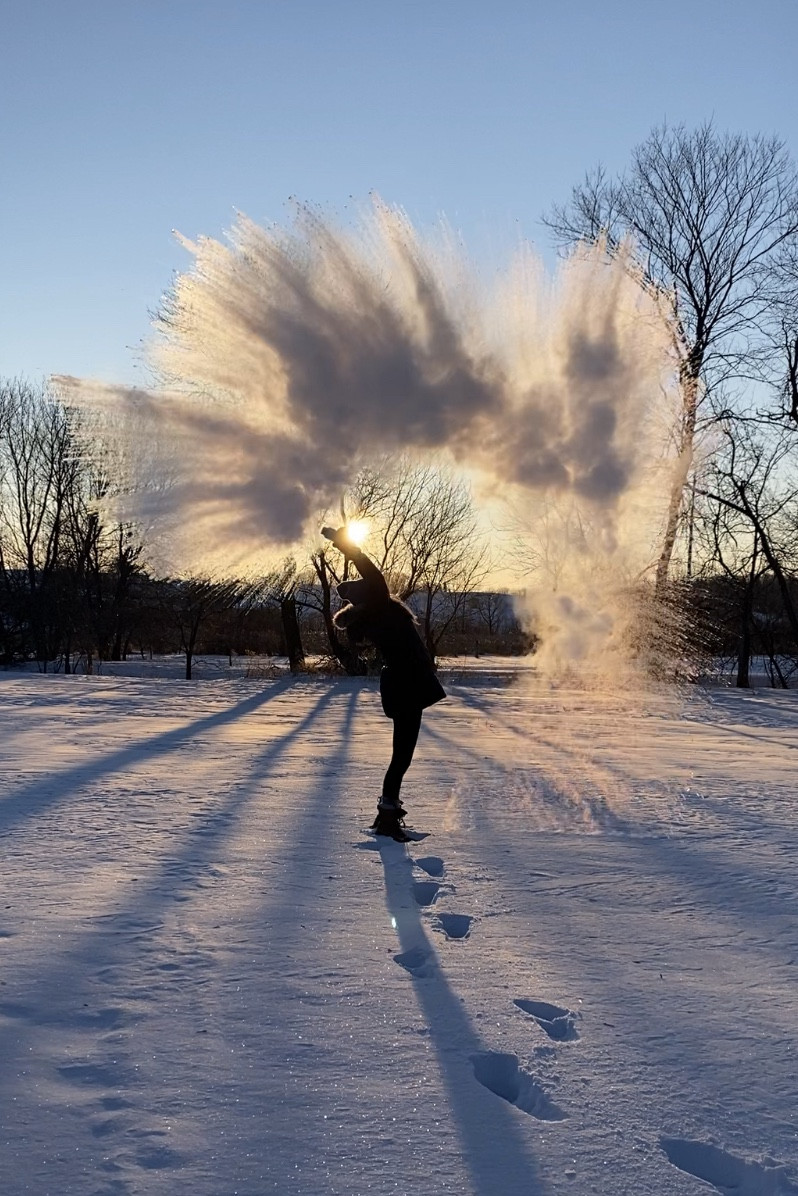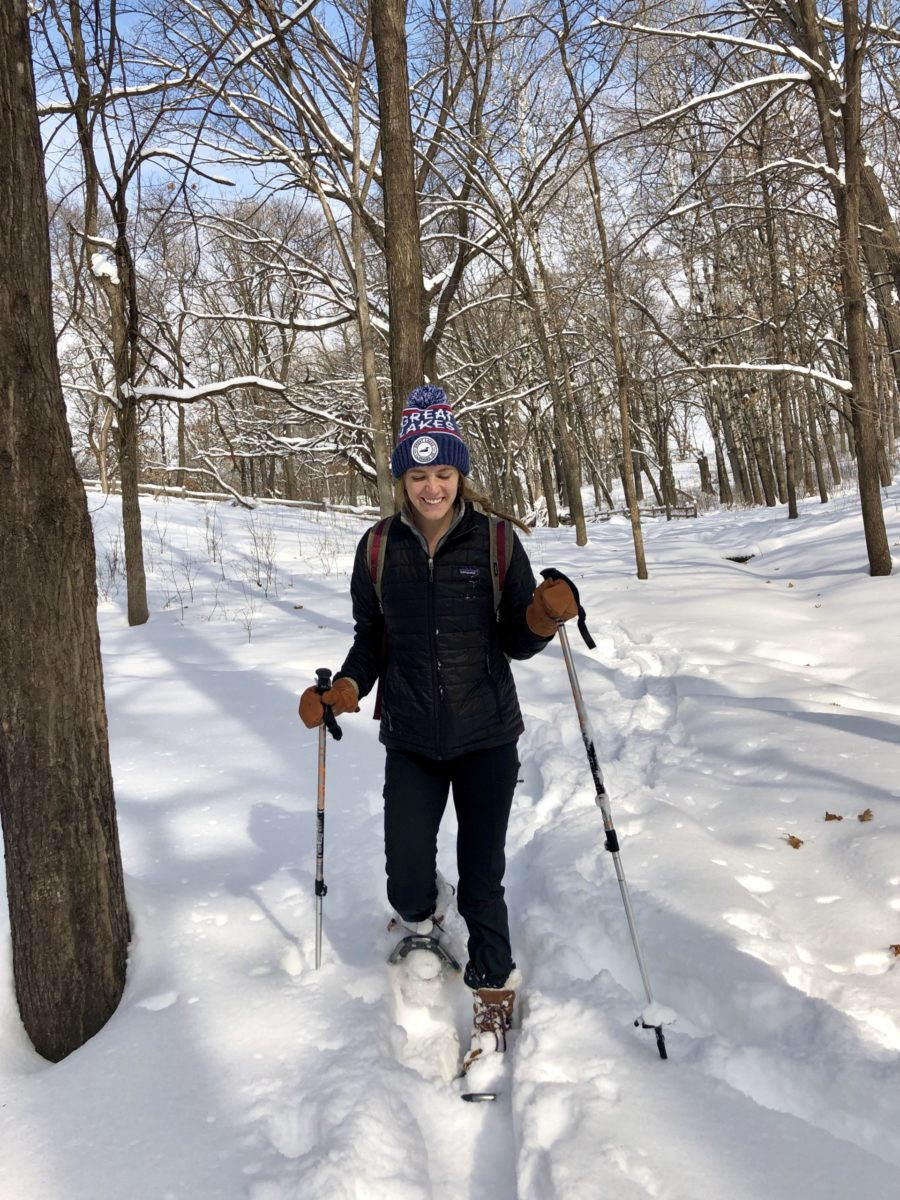Take cues from ancient wisdom and shift your mindset to transform your winter experience from daunting to delightful.
The shift into winter can feel like an affront to daily routines. With the end of daylight saving time, evening light fades, plunging our routines into darkness and leaving us to wonder, “What time is it again?”
Experts suggest modern conveniences exacerbate this seasonal ambush. Home amenities like motion-sensor lights and smart home heating systems enhance our daily lives, but they can disrupt a fundamental human instinct: adapting to seasonal changes.
“We are living out of sync with what is happening in our bodies,” says Kari Leibowitz, a health psychologist and author. “Our modern conveniences can work against us because they really reinforce this idea that you don’t need to seasonally adapt or change your behavior.”
It wasn’t always this way. Native American cultures like the Zuni in western New Mexico have long celebrated the coming of darkness and winter with rituals of dance and costumes. Persians have been celebrating the beginning of long winter nights since 502 B.C.
So, how can we adjust our routines to embrace the changing seasons rather than resist them?
The human body is designed to adapt to seasonal cues.
“During the winter our bodies go through a natural evolutionary cycle,” says Michael Varnum, a social psychologist and associate professor at Arizona State University, who studied seasonal effects on minds and bodies. “This isn’t learned behavior or coincidence. It’s part of some deeper, more instinctual programming.”
Our circadian rhythm, driven by exposure to light and darkness, regulates critical functions like sleep and energy levels. Morning light triggers the release of cortisol to energize us, while darkness stimulates melatonin, which prepares us for sleep. In winter, waking up in the dark can disrupt cortisol production and cause fatigue and changes in mood, says Leibowitz.
“There are a lot of parallels to hibernation in many other mammals,” adds Varnum. “You also see people exercise less. They eat more calorie-dense foods. You see changes in motivation.”
In winter, these physiological changes are guided by our evolutionary roots. Early humans slowed their pace to conserve energy during food shortages, but in today’s world of abundant grocery stores and delivery services, we often live against nature’s rhythms, says Leibowitz.
Living out of sync with seasonal changes wasn’t always the way. Many Ancient cultures and Indigenous communities embraced and integrated the natural cycles into their lives.
In ancient Persia, the festival of Yalda celebrated the longest night with poetry readings, watermelon and pomegranates, and candlelight to symbolize the triumph of light over darkness. The Celts, too, marked winter’s arrival with communal gatherings around fires during the solstice, viewing it as a time to reflect, renew, and connect with the cycles of nature.
Indigenous communities across North America have long marked the changing seasons with rituals, says Rosalyn LaPier, an Indigenous writer and environmental historian at the University of Illinois Urbana-Champaign.
“People planned their own lives around the cycles,” she says.
According to LaPier, an enrolled member of the Blackfeet Nation in Montana and the Red River Métis, these times represent liminal spaces where deities exchange day-to-night duties.
Similarly, the Sámi people of Northern Scandinavia categorize winter into three distinct phases—autumn winter, winter, and spring winter—to recognize the subtle shifts within the darker months, says Leibowitz. This careful observance of seasonal shifts encourages mindfulness, a practice shown to help reduce anxiety and improve mood by fostering a deeper connection to one’s environment.
Despite its bleak reputation, winter doesn’t have to be perceived negatively. Shifting our mindset can profoundly alter our experience of this season.
“It sounds like…mindset magic,” says Leibowitz, who wrote How to Winter, a book with strategies to develop a better winter mindset. “But there’s a really clear mechanism of how this can lead to beneficial outcomes.”
According to Alia Crum, a psychology professor and head of Stanford University’s Mind & Body Lab, our mindset—a set of beliefs that shapes how we perceive the world—affects our attention and, in turn, our behavior. So, focusing only on winter’s inconveniences can lead us to a negative outlook on the season.
To adopt a positive outlook, Leibowitz suggests a technique called “temptation bundling”—pairing an activity you dislike with something enjoyable. If driving home from work in the dark feels dreary, plan a candlelit dinner or a warm bath afterward to brighten your mood.
To buffer the shock of less daylight, throw a daylight saving or a winter solstice celebration. Planning a winter celebration trains your attention and gives you the agency to celebrate rather than get ambushed by seasonal changes.
Readying your space for winter is another strategy that taps into the power of rituals. Rotating those summer clothes to the back of the closet (yes, even in locales with milder winters) or setting up twinkly lights can send positive cues that winter is cozy.
“It can sound fluffy, but I think when you actually do it with the intention you can actually welcome and celebrate the darkness,” says Leibowitz.
Above all, experts agree on the importance of spending time outdoors—even in the cold.
“You don’t need to go to a national park,” says LaPier. “You can experience nature wherever you are. You just need to go outside.”
Noticing the changing landscapes, plants, and trees fosters a connection to the rhythms of the natural world. Leibowitz recommends taking photos of these observations, which can help cultivate mindfulness and allow for sharing positive experiences with friends.
“It’s not a total fix,” says Leibowitz about those long winter days. “But can you make your winter 20 percent better?”
Attuning ourselves to the seasons can also nurture self-compassion. Recognizing that our bodies and minds ebb and flow with the seasons allows for greater kindness toward ourselves during the holiday rush.
“Like the seasonal cycle, there is going to be a fallow period,” says Varnum. “But then it will warm up. Moods will shift. Energy levels will naturally change.”
We just need to pay attention to the cues.
As a nation, we don’t deal with winter brilliantly. It is something to hunker down and endure, to moan about to friends and neighbours as you count down the days until spring, or to escape entirely. But it doesn’t have to be this way.
“People underestimate how pleasurable winter can be – but you have to go into it prepared, both physically and mentally,” says Kari Leibowitz, a psychologist and author of How to Winter: Harnessing Your Mindset to Thrive in Cold, Dark or Difficult Times, who a decade ago moved for a year from the US to Trømso in Norway, where the sun doesn’t rise for two months a year.
“In Norway, people have a positive attitude towards the winter. It’s not that nobody struggles, or feels the effects of dark, cold days and nights on their energy, but they see winter not as a limiting time of year, but as one full of opportunity. A few lifestyle changes and a different mindset can go a long way in helping you to live more in tune with the seasons.”
Here, a range of experts discuss how sleeping, eating, moving and thinking a little differently can help us embrace, and even thrive, throughout winter…
“When we focus on the season’s limitations, we feel those limitations acutely. But when we train ourselves to work with rather than against winter’s qualities, we can find opportunities for comfort and pleasure. Many activities are more enjoyable when it’s cold and rainy, such as baking, knitting, art, reading, going to museums and the cinema. Or you can find pleasure in sipping a warm drink by the fire. We so often look at winter for what it isn’t, wishing it were other warmer, brighter seasons, but the cold and darkness can make space for more restorative or creative activities that aren’t open to us in warmer climes. Look for the opportunities winter provides and indulge in them.” Kari Leibowitz
“During dark, wintry days it can be tempting to stay indoors and keep working, but at this time of year it is more important than ever to maintain a healthy work/life balance. Avoiding social interaction can lead to feelings of isolation and depression, so finish work on time and avoid checking work emails or messages outside of hours. By keeping to these boundaries, you are more likely to be focused and efficient during the working day and have greater job satisfaction. Use your personal time for self-care, exercise, hobbies and socialising, as these activities will boost your mood, recharge your energy and prevent burnout.” Alison Goolnik, psychotherapist, Therapy Here
“This may not be a welcome piece of advice, but indulging in hot showers can damage skin. This can be especially problematic in winter, when skin can become dry from indoor heating and outside temperatures. Try to wash with warm water and use hypoallergenic formulations and perfume-free products that specifically target sensitive skin, so as not to strip away natural oils. It is also important to choose a moisturiser that suits your skin type. For oily, acne-prone skin, go for one that won’t clog pores. For those prone to eczema and rosacea, choose a thicker moisturiser for extra protection.” Dr Ophelia Veraitch, dermatologist
“Although humans don’t hibernate, research shows that we do need more REM sleep in the winter. To make sure you are getting enough rest, it is important to be strict with your bedtime routine. Bedrooms should be for sleeping (and one other thing). That means no phones, TVs, knitting or journalling in the bedroom. Stick to no caffeine after 3pm and reduce fluids two hours before bed to prevent midnight toilet breaks – which no one wants on a freezing cold night.” Natalie Mackenzie, brain and cognition expert
“Winter can affect your energy levels throughout the day, but managing your tasks around natural energy peaks can optimise both your mental wellbeing and work output. Schedule your most challenging or creative tasks for when your energy is highest – this is often in the morning after your first coffee – and leave more routine tasks for lower-energy periods like the late afternoon.” Smriti Joshi, chief psychologist, Wysa
“Being too hot or too cold at night can negatively affect our sleep. An ideal night-time bedroom temperature is around 16-18°C, as this allows a drop in core body temperature as we sleep. With the reduced temperatures during the winter, you may wish to increase the tog (or thickness) of your duvet so that you don’t get too cold in the night, and you could consider a separate duvet from your partner if you have different preferred nighttime temperatures.” Lindsay Browning, sleep expert at Trouble Sleeping and author of ‘Navigating Sleeplessness‘
“Try to spend time outdoors every day, especially in the morning, when the light is brightest, to make the most of natural daylight, which is vital for our circadian rhythm. Even a short walk can help to reset your mind and boost your mood – but be sure to dress appropriately for the weather. If you can spend time in nature, the benefits will be even greater, as a daily dose of nature therapy has been proven to improve mood and reduce blood pressure.” Dr Elena Touroni, consultant psychologist and co-founder of The Chelsea Psychology Clinic
“While spending time outdoors is always best, make the most of the amount of natural light you are exposed to at home and in the office. Sitting near a window or keeping curtains open during the day can help your body adjust to shorter days. If you can, arrange your workspace near windows to soak in any available natural light; if this isn’t an option, use lamps to simulate daylight and reduce feelings of drowsiness.” Dr Elena Touroni
“Sex has been shown to have numerous health benefits, including lowered stress, depression and anxiety, perhaps due to the release of oxytocin and a fall in cortisol levels. Getting intimate can also reduce pain, and improve sleep and immune function, which is essential for staving off colds and infections during the winter months. Plus, orgasms can boost circulation and reduce inflammation, helping you to stay warm on cold nights.” Dr Deborah Lee, sexual and reproductive health specialist Dr Fox Online Pharmacy
“Our bodies require slightly more calories than normal to stay warm in winter, but greasy, refined carbohydrates such as pizza and chips will make you feel more sluggish in the long run. Instead, opt for comforting meals that are going to make you feel full, but are also packed with nutrients. Bone broth is full of the vitamins and nutrients that your body needs to fight off sickness, including protein, energy-filled electrolytes and essential amino acids. Or opt for hearty stews with dark leafy greens, such as spinach, kale, and bok choy, which are rich in vitamins such as magnesium and vitamin B to help regulate mood.” Dr Abir Hamza-Goodacre, nutritional therapist, Benenden Hospital
“Drinking coffee is a great way to feel more energized. Researchers have found that drinking a cup of coffee containing 75mg of caffeine every four hours can lift your mood over the course of a day (although be sure to tail off your caffeine intake in the afternoons if you have sleep issues). Coffee also contains a high concentration of polyphenols, which counteracts neuroinflammation and stimulates the production of new brain cells. Just watch out for added sugars in syrups and creamers, which can offset the health benefits and send blood-sugar levels soaring.” Dr Deborah Lee
“Winter is a time for hibernation in the animal kingdom, but so often people try to ‘push through’ the seasonal change, then wonder why their exercise motivation wanes. Don’t force yourself to stick to your ‘usual’ intense conditioning training and HIIT classes if it’s not working for you. Lean in to lower impact forms of exercise that match the cosy vibe of winter – whether that’s mat Pilates, slow strength training or yin yoga.” Nancy Best, personal trainer and founder of Ladies Who Crunch
“Kindness not only improves friendships and relationships, but researchers have found that acts of kindness can lower blood pressure and benefit the immune system. During winter, when so many people struggle with low mood, being kind can elevate levels of dopamine and oxytocin in the brain, and some acts even produce endorphins. Try talking to loved ones about how they are feeling, buy a stranger a coffee, or help a friend with some chores.” Dr David R Hamilton, author of ‘The Joy of Actually Giving a F**k’
“The winter months are often quieter when it comes to social plans (apart from Christmas). Use this time to set yourself a goal that you’d like to achieve before spring comes around again. It could be anything, from decorating a particular room to finishing a book you’ve always wanted to read or taking up a new hobby. Challenging yourself with something new can give you a renewed sense of purpose and motivation.” Dr Elena Touroni
“Honour the impulse to hibernate by allowing yourself to get more rest but don’t get lazy. Enjoy cosy evenings, but make sure you are getting out and about during the day. If you can’t face moving outdoors, get down on the floor and do some stretches. Watch your intake of sugar, comfort food and booze, and remember that comfort can also come in the form of candles, a nice bath or grounding practices such as snuggling in with a weighted blanket.” Suzy Reading, psychologist and author of ‘Self-Care for Winter’
“It is not uncommon to agree to social events or family plans that you would really rather avoid, especially during festive periods when there is pressure to show up for everyone. However, overextending yourself can lead to resentment or burnout, as well as illness. Decide early what your non-negotiables are – whether that is protecting family time or ensuring you have quiet evenings to rest. Communicate your boundaries with friends, family, and colleagues so you are not caught in a cycle of over-commitment and remember that a gentle but firm ‘no’ can protect your energy while allowing you to be fully present when you do say ‘yes.’” Charlotte Bailey, psychotherapist
“It is normal to feel your appetite for social interaction change in the winter months, but we still need to plug in and feel connected. Allow the nature of your connections to evolve with the seasons and find different ways of coming together. If you don’t fancy being out of an evening, make brunch plans or schedule time for a morning walk and a coffee.” Suzy Reading
“While it is tempting to sleep in, especially when it is cold outside, a consistent waking routine helps to regulate your body’s circadian rhythm. Long lie-ins can disrupt your natural sleep-wake cycle, making it harder to fall asleep at the right time the next night, and you may miss out on vital morning sunshine if you lie in too late. If you feel that you need some extra sleep at the weekend, consider an early afternoon nap (around lunchtime) when we have a natural circadian dip, rather than oversleeping in the morning.” Lindsay Browning
“The NHS recommends that between October and March, people in the UK should take a vitamin D supplement (10 micrograms a day will be enough for most people). This is really important for your bone and muscular health, as well as boosting your immune system. It can also help combat SAD (seasonal affective disorder), so it is valuable for your mental wellbeing, too.” Nancy Best
“Herbal teas are useful in helping use to recover from cold and flu symptoms, as they contain plenty of antioxidants and are hydrating. Green tea contains high levels of L-theanine, which is a chemical that has been shown to support cognitive functions, sleep and blood pressure, and to encourage relaxation. Peppermint tea can help with an upset stomach, constipation and irritable bowel syndrome, while rooibos tea can improve blood pressure and circulation.” Dr Abir Hamza-Goodacre



















